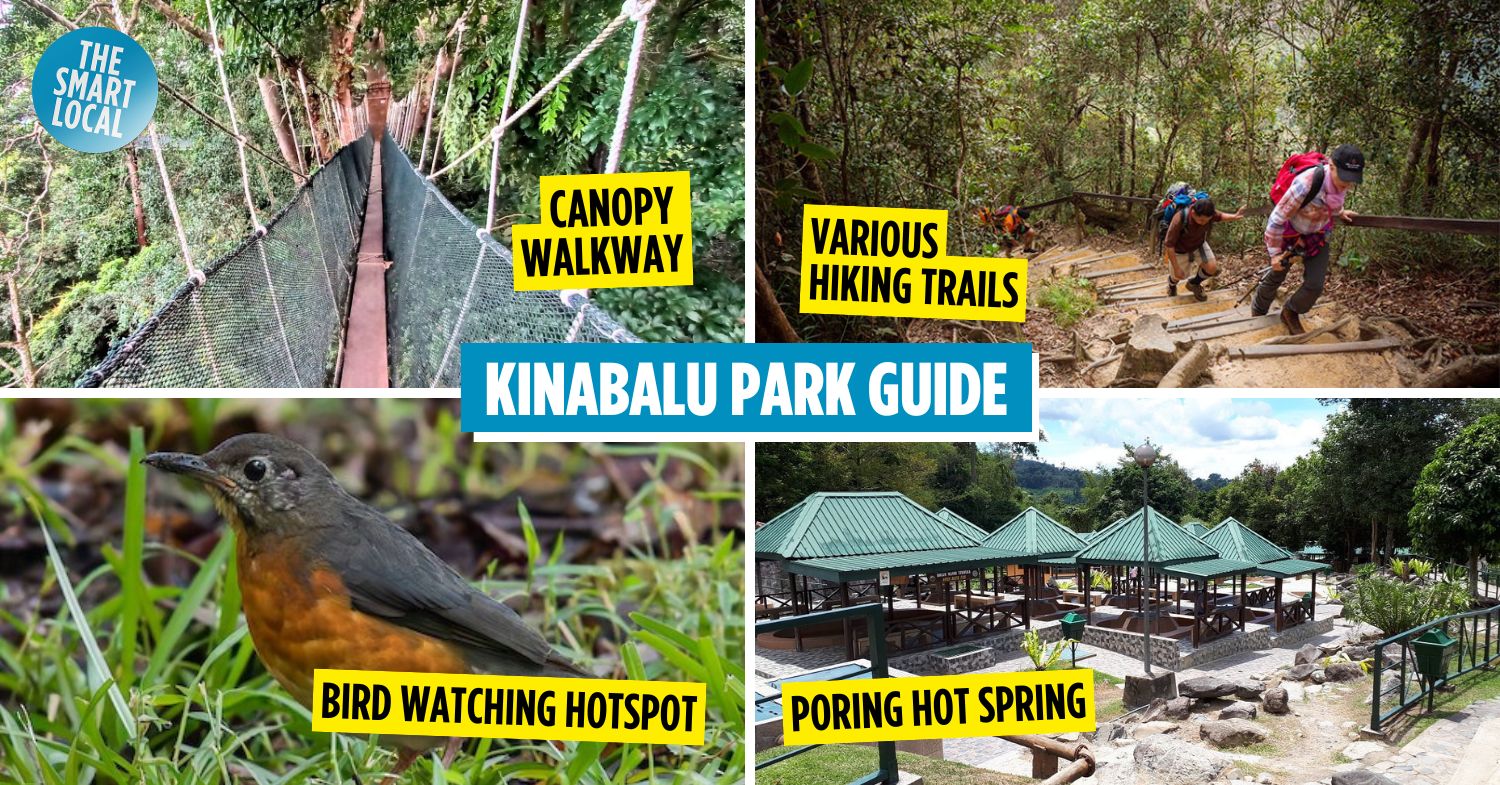Kinabalu Park in Sabah
Kinabalu Park, also known as Taman Kinabalu and Kinabalu National Park, is a unique attraction in Sabah. Surrounding Mount Kinabalu, the park spans 754sqkm of hiking trails, a botanical garden, rare species of flora and fauna, and neighbouring attractions from Poring Hot Spring to the Kundasang War Memorial.
If you’re a hiking enthusiast, nature lover, or simply a visiting tourist, here’s a guide to Kinabalu Park to help you make the most out of your experience there.
Table of Contents
All you need to know about Kinabalu Park
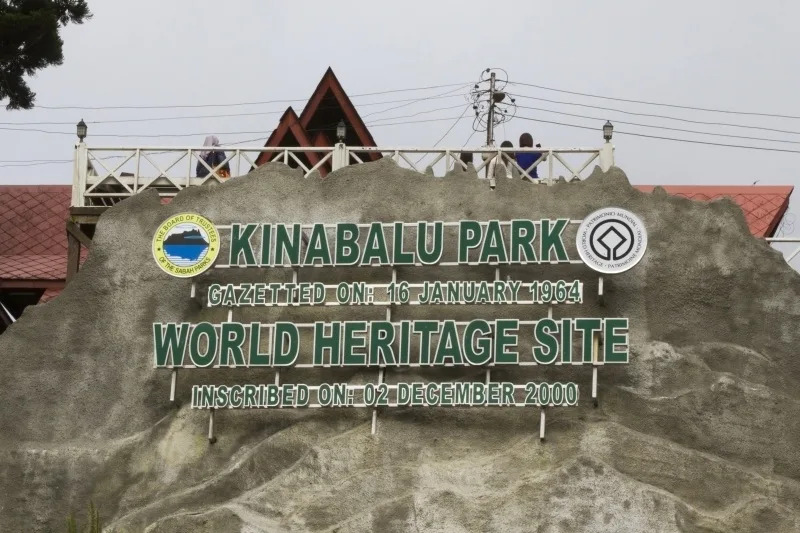
Image credit: Reflections Enroute
Kinabalu Park was designated the first UNESCO World Heritage Site in Malaysia in 2000.
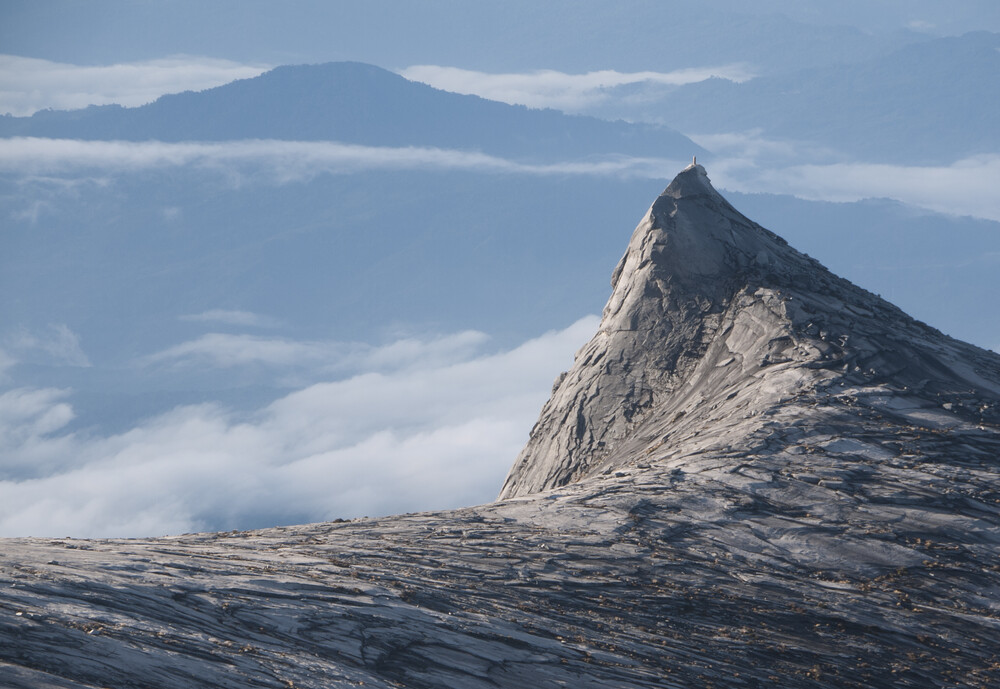
Image credit: OUR PLACE The World Heritage Collection via UNESCO World Heritage Convention
What’s more, it was designated as a Centre of Plant Diversity for Southeast Asia and is home to Mount Kinabalu, the highest peak in the region.
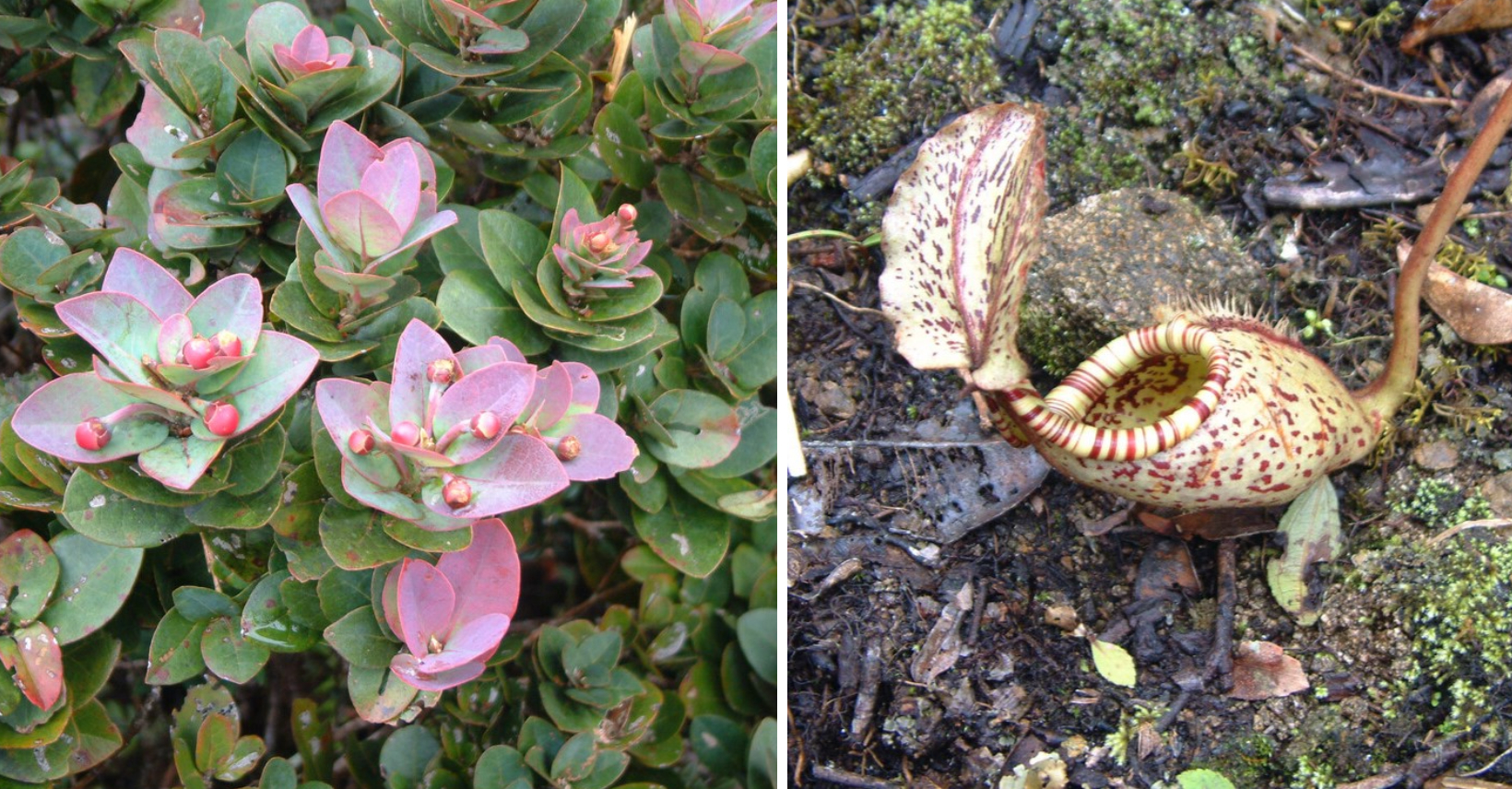
Image adapted from: Evergreen, Evergreen via UNESCO World Heritage Convention
Known for its rich biodiversity, stunning landscapes, and unique ecosystems, the park has an extensive range of habitats from a tropical lowland to a subalpine forest that visitors can explore.
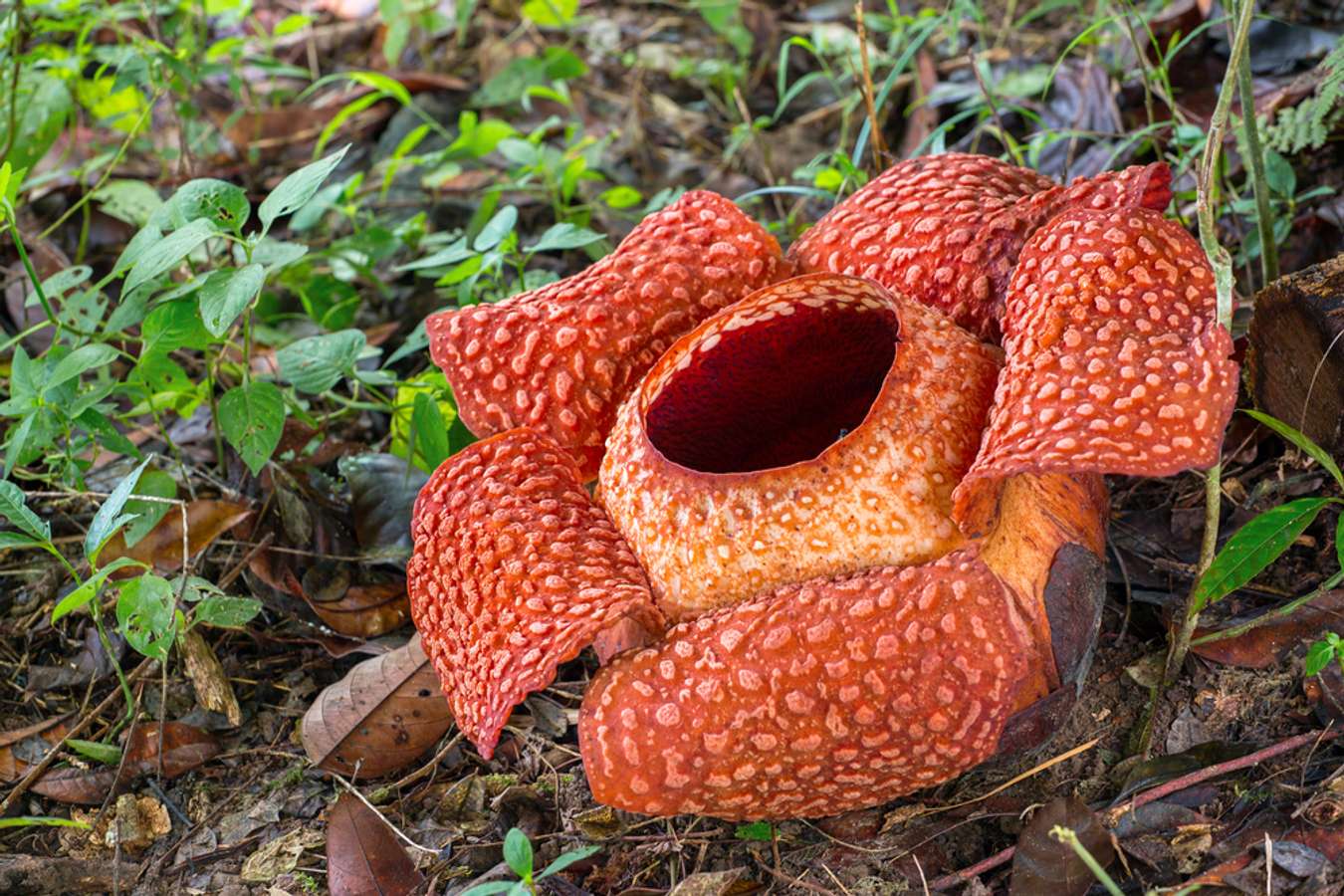
A Rafflesia in bloom.
Image credit: Traveloka
While you’re there, grab the opportunity to witness some rafflesias, the biggest flower in the world, in bloom.
What’s the best hiking trails at Kinabalu Park?
While many hikers aim to climb Mount Kinabalu when they visit Kinabalu Park, some may prefer to hike without reaching the summit. Luckily, the park offers numerous hiking trails to choose from that are suited for hikers of all levels.
Being accompanied by a Sabah Park Ranger, Park Naturalist, or licensed tour guide is mandatory.
1. Mountain View Trail
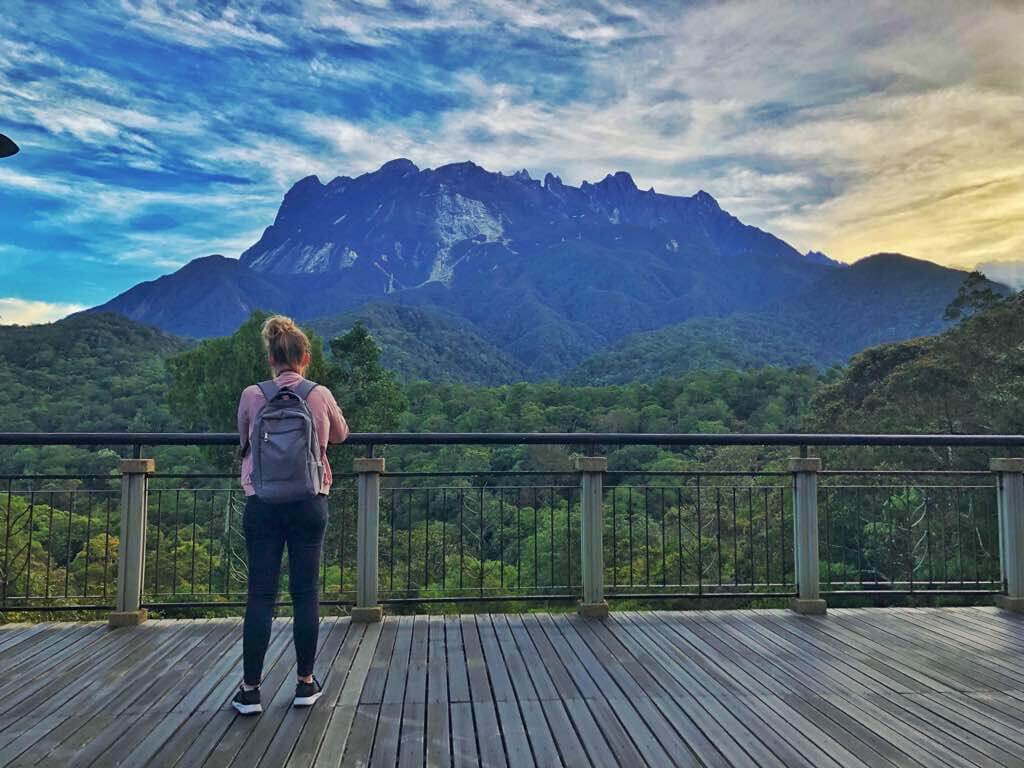
Image credit: MountKinabalu.com
Easiest of them all, the Mountain View Trail only takes 15 minutes to complete. It’ll lead you to a shelter where you can see a picturesque view of Mount Kinabalu.
This is your chance to take an aesthetic photo – or ten.
Difficulty: Easy
2. Bundu Tuhan View Trail
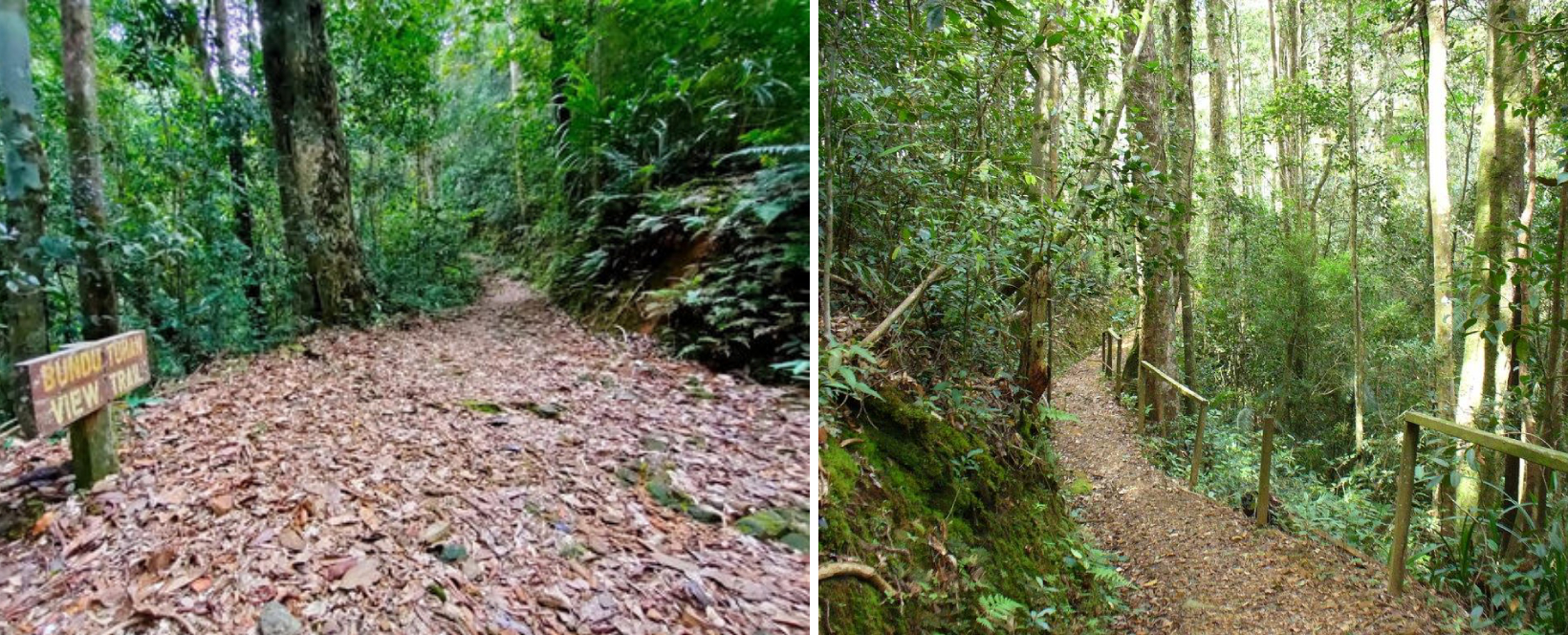
Image adapted from: Montigo, J Residence via Facebook
The Bundu Tuhan View Trail, on the other hand, offers great views of the Kinabalu Conservation Centre and Bundu Tuhan Village. This short 30-minute hike is great for beginners.
Experienced hikers can also go through this trail to enter the Liwagu Trail.
Difficulty: Easy
3. Silau Silau Trail
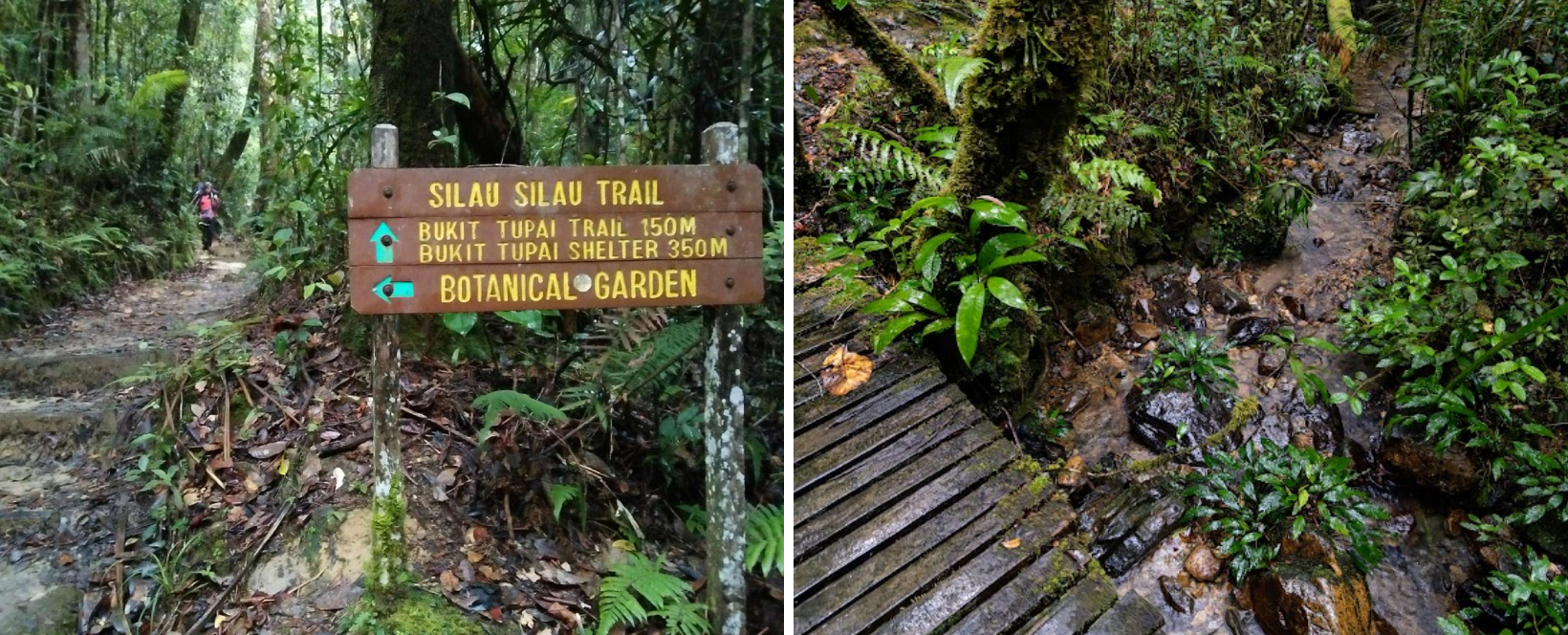
Image adapted from: Traveloka, Meowtain People
The Silau Silau Trail is another great choice for beginners. With its flat terrain, the trail is considered a smooth and easy hike. What’s more, the trail takes you to a refreshing view of the Silau Silau River and greenery such as mosses and wild orchids.
If you’re up for more exploration, this trail also connects to several others such as the Bukit Tupai and Bukit Burung trails.
Difficulty: Easy
4. Bukit Tupai and Bukit Burung Trails
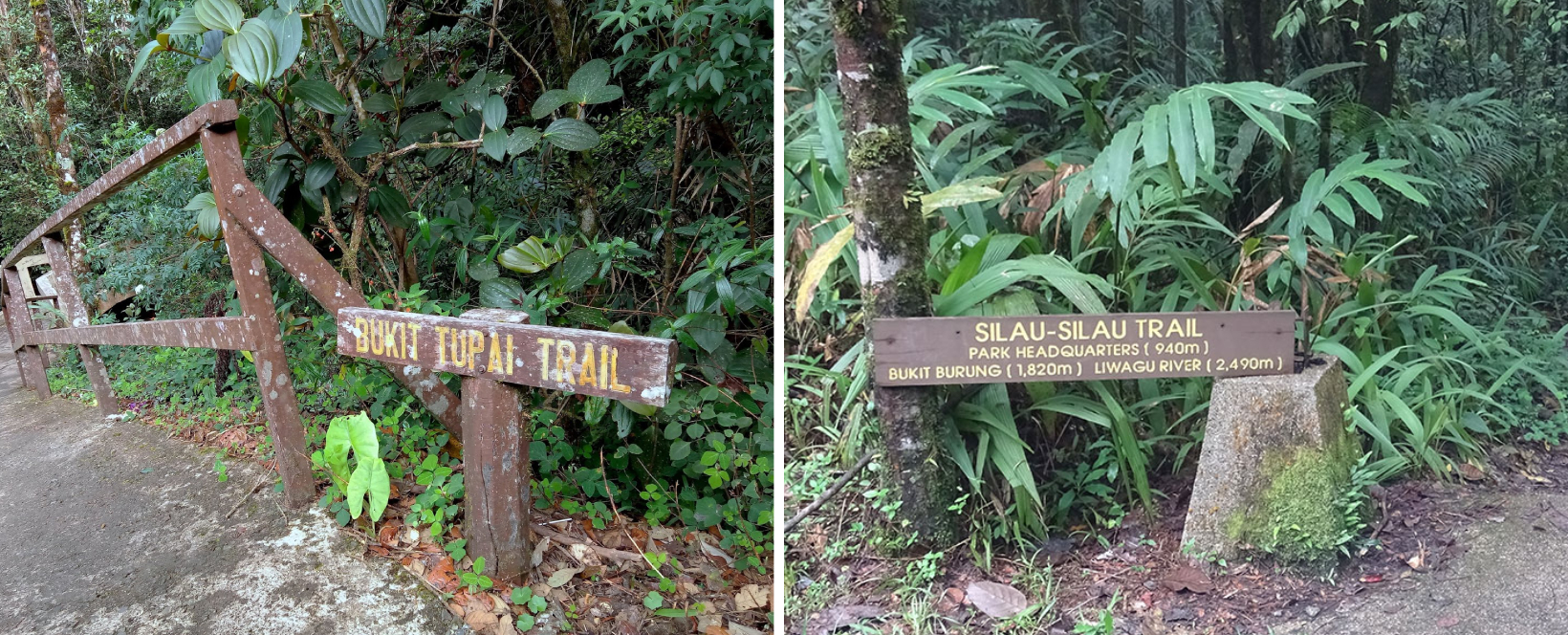
Image adapted from: Jack Jill Foodveler, Ferngeweht
The Bukit Tupai and Bukit Burung Trails are short hikes up a hill, connecting to the Silau Silau and Mempening trails. Altogether, the hike only takes about an hour and 30 minutes to finish.
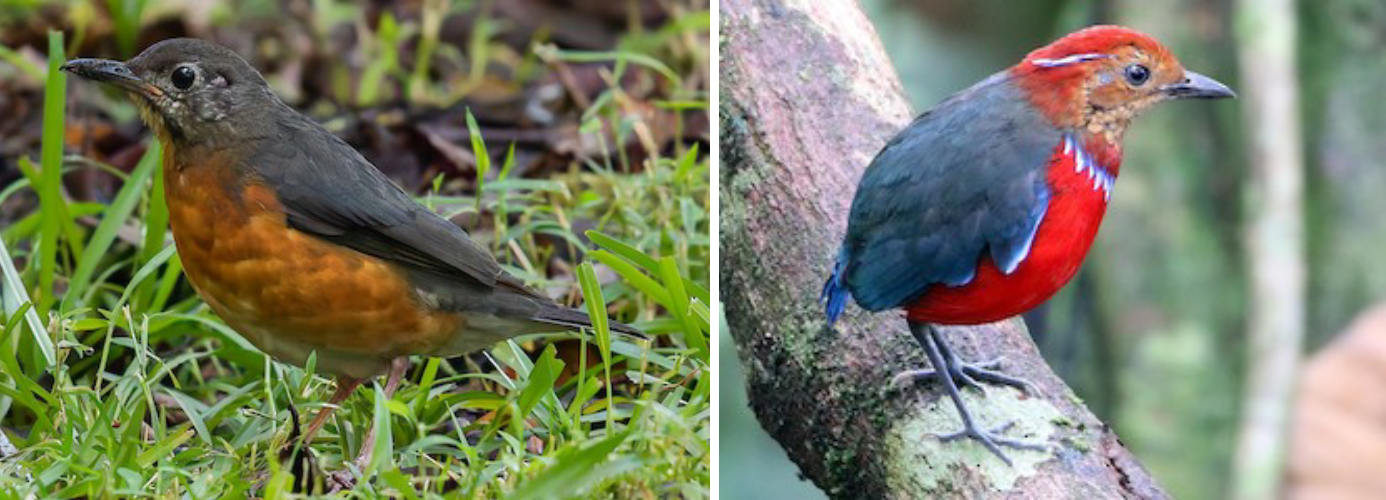
Everett’s Thrush and Blue-banded Pitta bird species
Image adapted from: eBird, eBird
These trails are known to be the perfect spots for bird watching. If you’re lucky, you might even see an Everett’s Thrush or a Blue-Banded Pitta, bird species that are both endemic to the island of Borneo.
Difficulty: Medium
5. Pandanus Trail
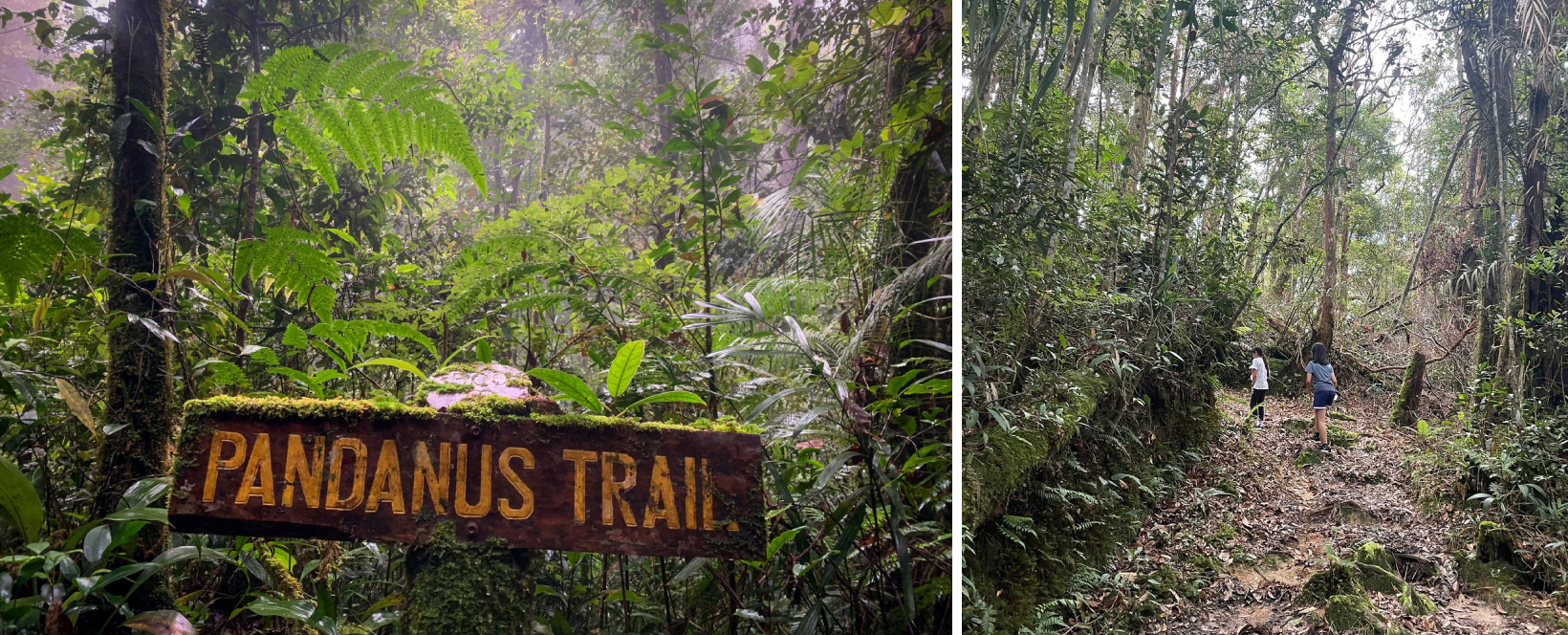
Image adapted from: South East Asia Backpacker, Cheeps21 via Tripadvisor
Those who hiked Pandanus Trail will tell you that it’s short, but tough. It’s known for its steep terrain and slippery grounds, a great choice for adventure-seekers up for a challenge.
Additionally, this trail connects to the Kiau View Trail in case you want to try tackling both trails on a single visit.
Difficulty: Medium
6. Kiau View Trail
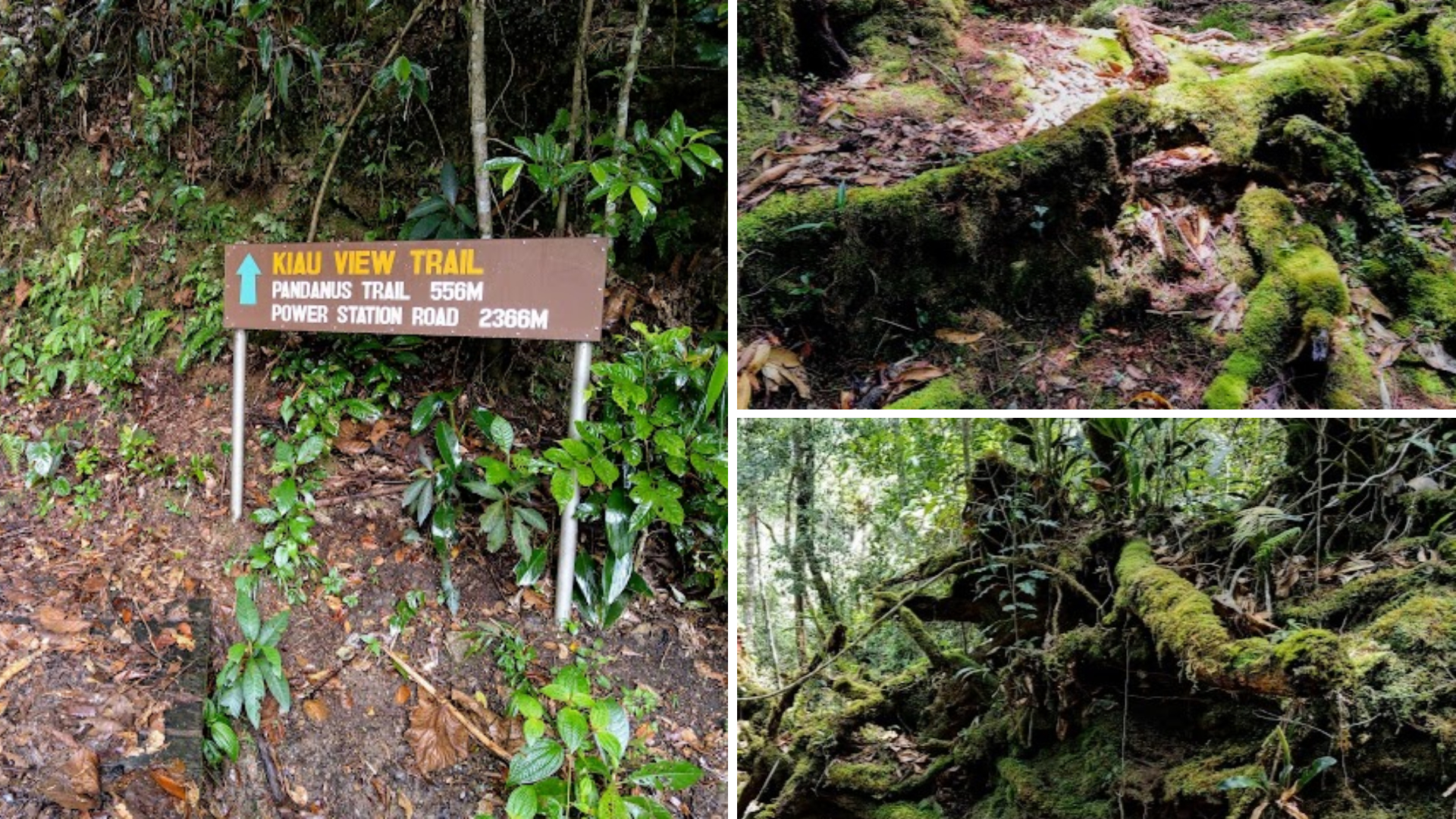
Image adapted from: Meowtain People, Meowtain People, Meowtain People
If you’re close by the parking at the entrance of the park, you’ll easily find the starting point of the Kiau View Trail that is just nearby. It’s a relaxing uphill trek that walks you through mossy logs and just a handful of fallen tree branches to give your legs a good workout.
Bear in mind that some hikers claim to have encountered leeches, so make sure to stay safe and alert.
Here are some tips to consider to go through the forest unscathed:
- Wear protective clothing such as long-sleeved shirts and trousers to lessen the amount of skin exposed.
- Apply insect repellents or natural oils such as citronella for added protection.
- Avoid damp and overgrown areas as much as possible.
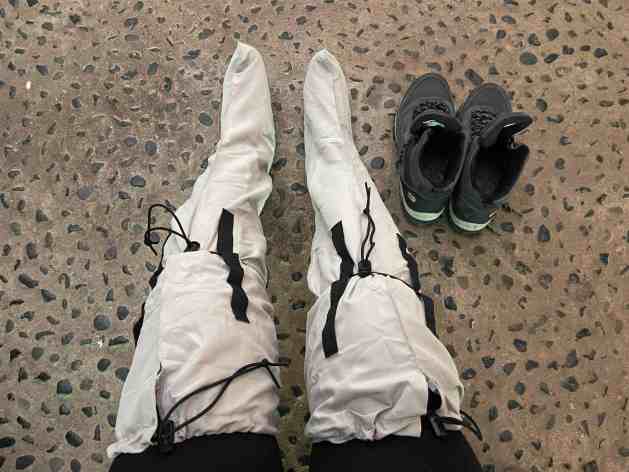
Image credit: The Flains Travel
You can even go the extra mile and invest in a good pair of leech socks – yes, they exist. These waterproof-like socks will prevent leeches from penetrating your skin.
Difficulty: Medium
7. Mempening Trail
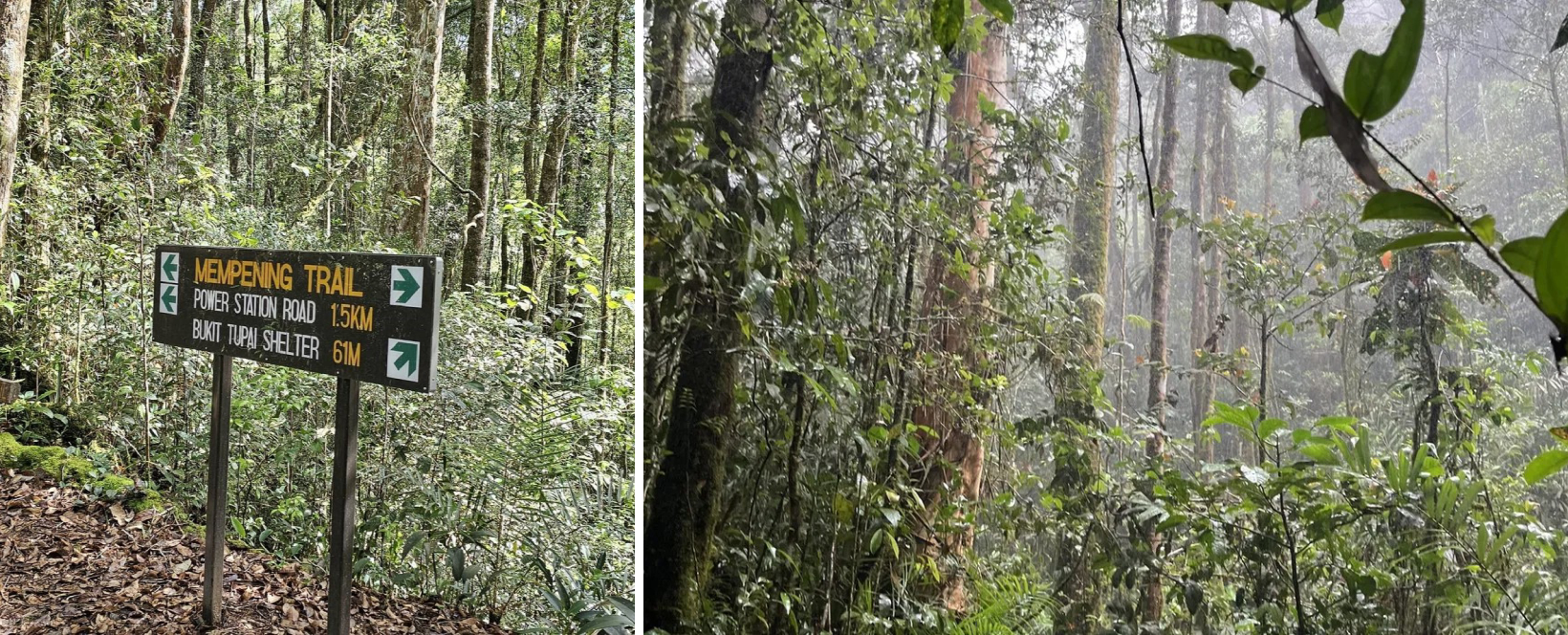
Image adapted from: Komoot. AllTrails
An ode to the Mempening tree, the Mempening Trail leads to a forest filled with these majestic Malaysian oak trees, offering a scenic route for hikers passing by.
Although it takes up to 2 hours and 30 minutes to complete, the trail is well-suited for beginners with its fairly flat terrain. Moreover, it serves as a connecting point to other trails such as the Liwagu Trail and Bundu Tuhan View Trail.
Difficulty: Intermediate
8. Liwagu Trail
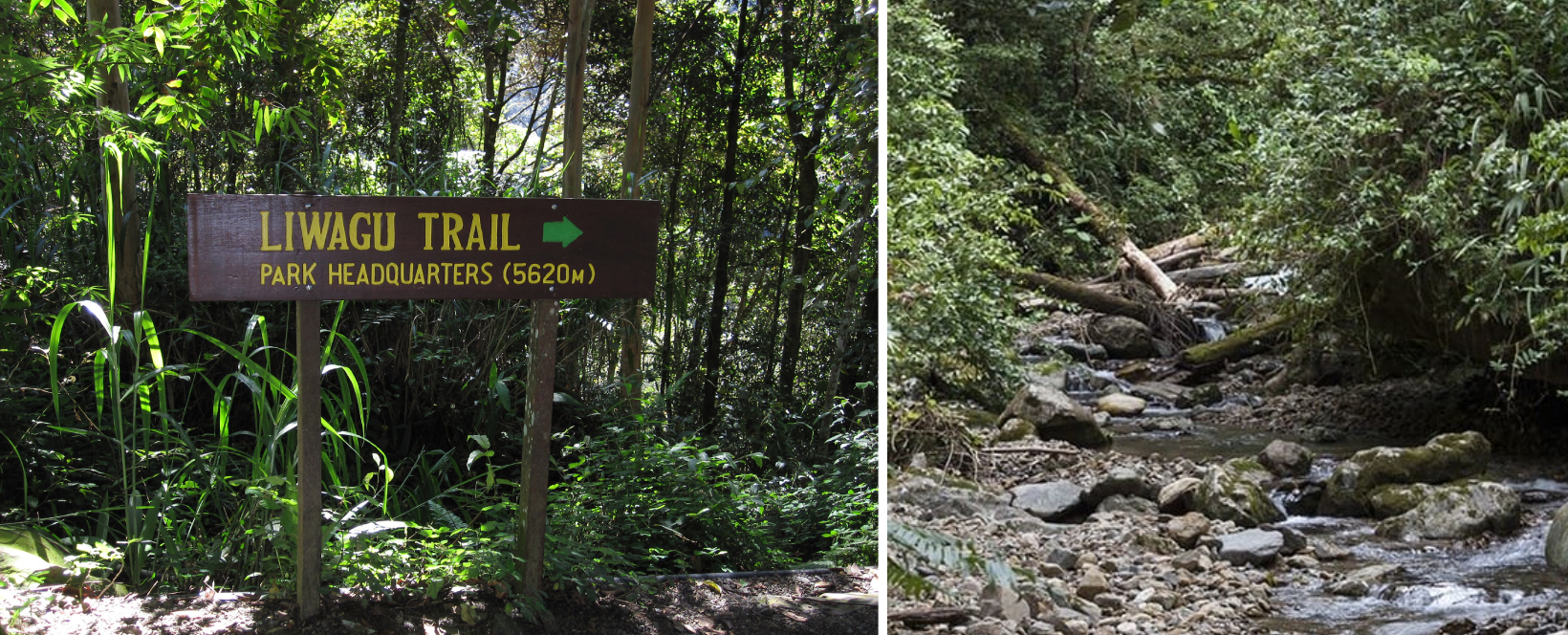
Image adapted from: Tore via Flickr, The Crowded Planet
The longest trail of all is the Liwagu Trail. Best suited for adventure seekers and experienced hikers, the trail goes through a waist-deep river crossing, and a series of streams and narrow ridges.
Difficulty: Intermediate
What to do in and near Kinabalu Park?
1. Botanical Garden
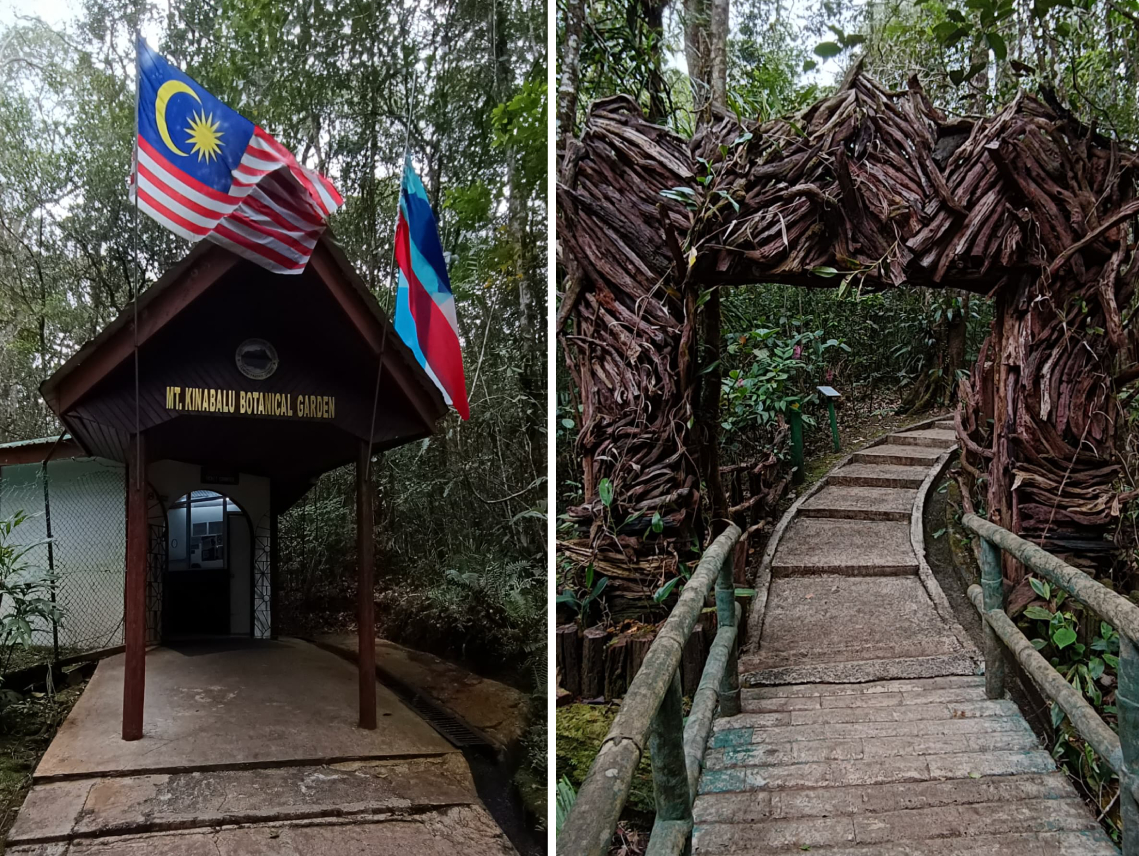
Image adapted from: Tania Tan via Google Maps, Tania Tan via Google Maps
Located within the park, the Botanical Garden houses rare species of plants and flowers in their natural habitat for visitors to admire.
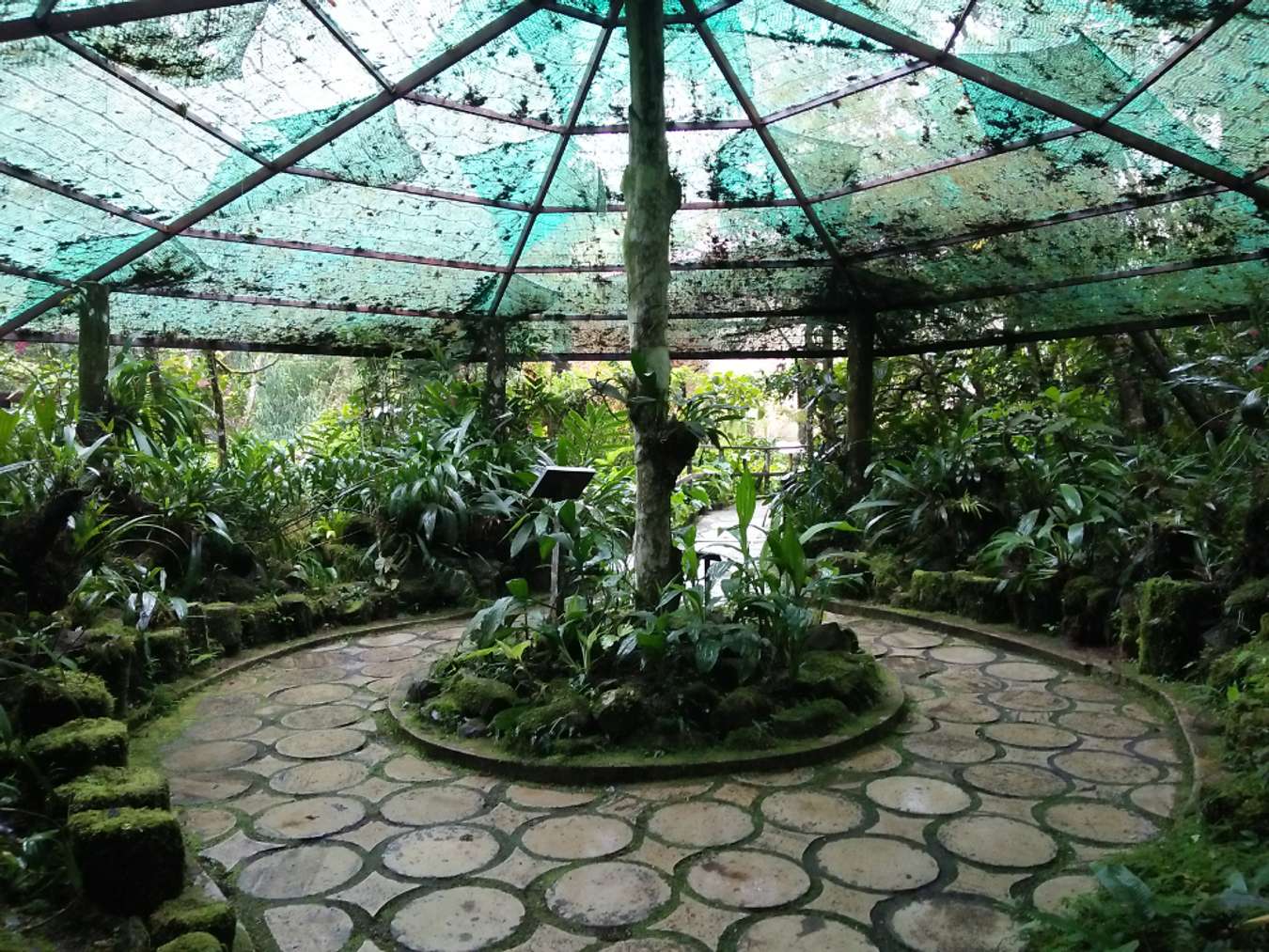
Image credit: Traveloka
While you’re free to roam the garden trail on your own from 9am to 4pm, locals recommend joining the guided tours during 9am, 12pm, and 3pm, to fully learn about the flowers, endemic plants, local herbs, and more.
2. Poring Hot Spring
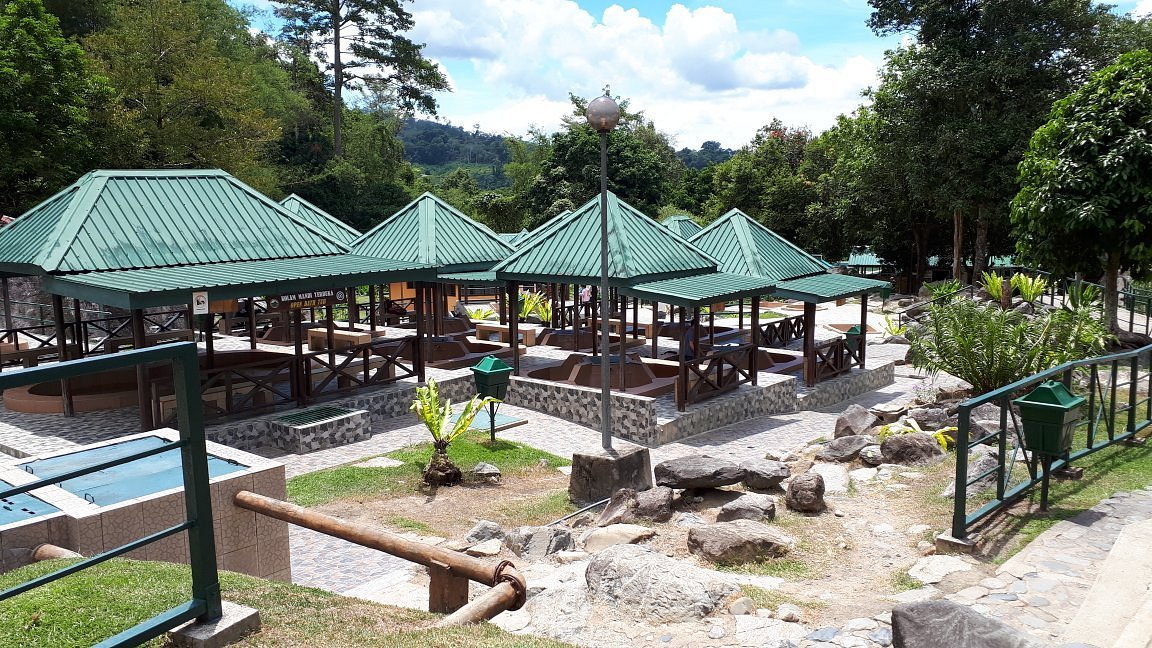
Image credit: Chris L via Tripadvisor
Poring Hot Spring is just an hour drive from the Kinabalu Park headquarters. The site is filled with public (RM15/hour) and private (RM20/hour) baths of natural sulphuric hot springs, perfect for relaxation after a long hike.
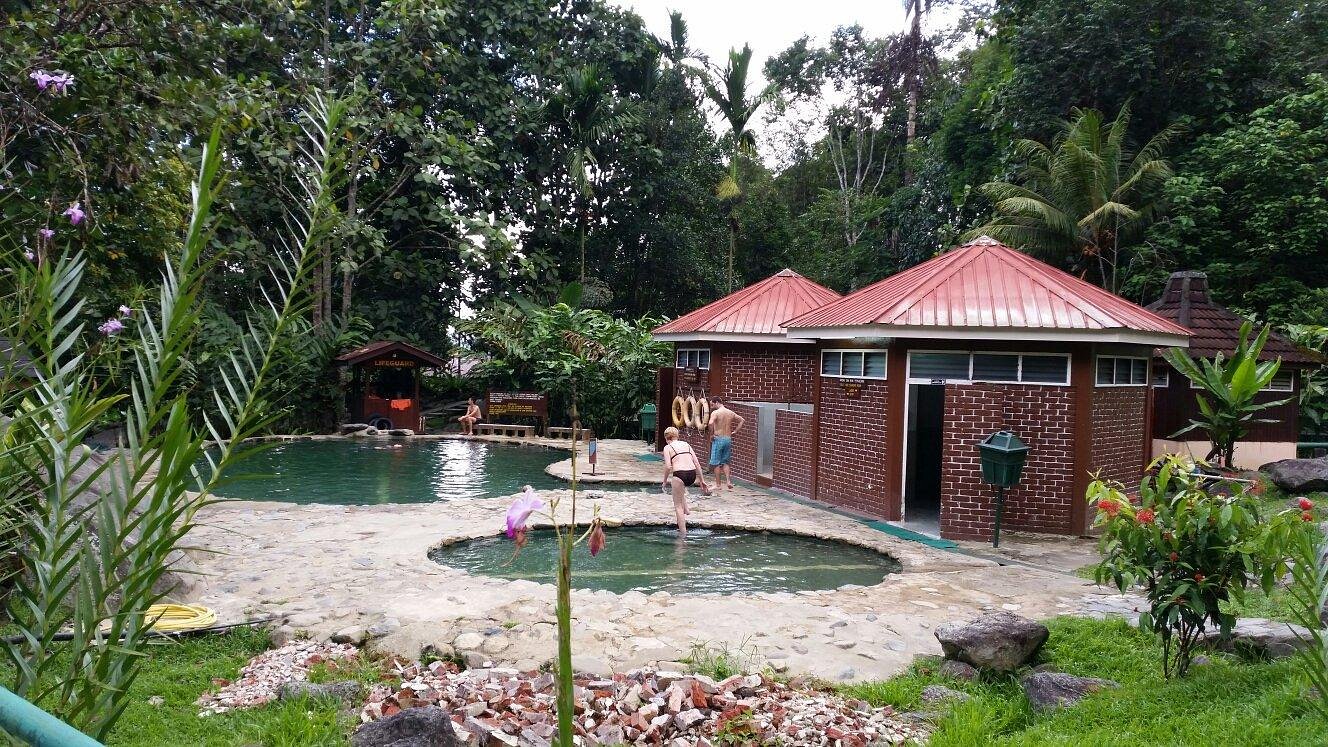
Image credit; ALYMA2013 via Tripadvisor
Aside from the hot springs, you can also enjoy a refreshing dip in the rock pool. Moreover, you can rent a locker for RM2 to safely store all your belongings while you soak away.
Poring Hot Spring is open daily from 8am to 5pm, with the last entry at 3pm.
3. Canopy Walkway
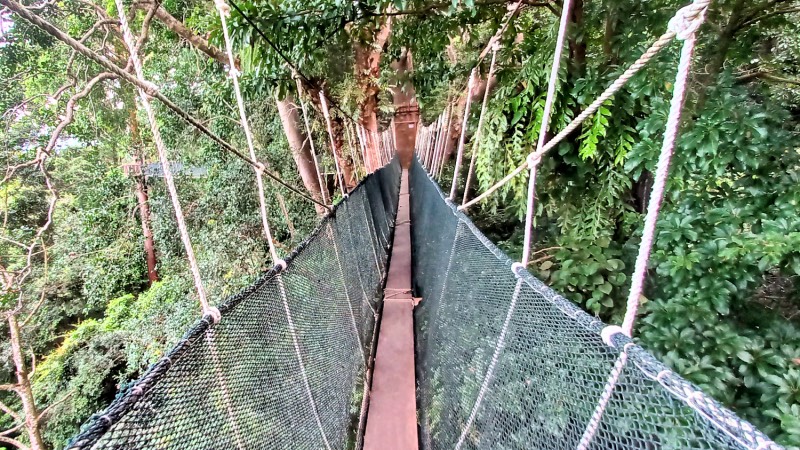
Image credit: The Backpacking Family
The Canopy Walkway can be found within Poring Hot Spring. Bear in mind that this 15-minute activity is not for the faint-hearted as the bridge easily wobbles when you walk across it.
While you’re allowed to take photos, a fee of RM5 is required for the usage of all types of cameras when you’re on the walkway, including smartphones.
4. Mount Kinabalu International Climbathon
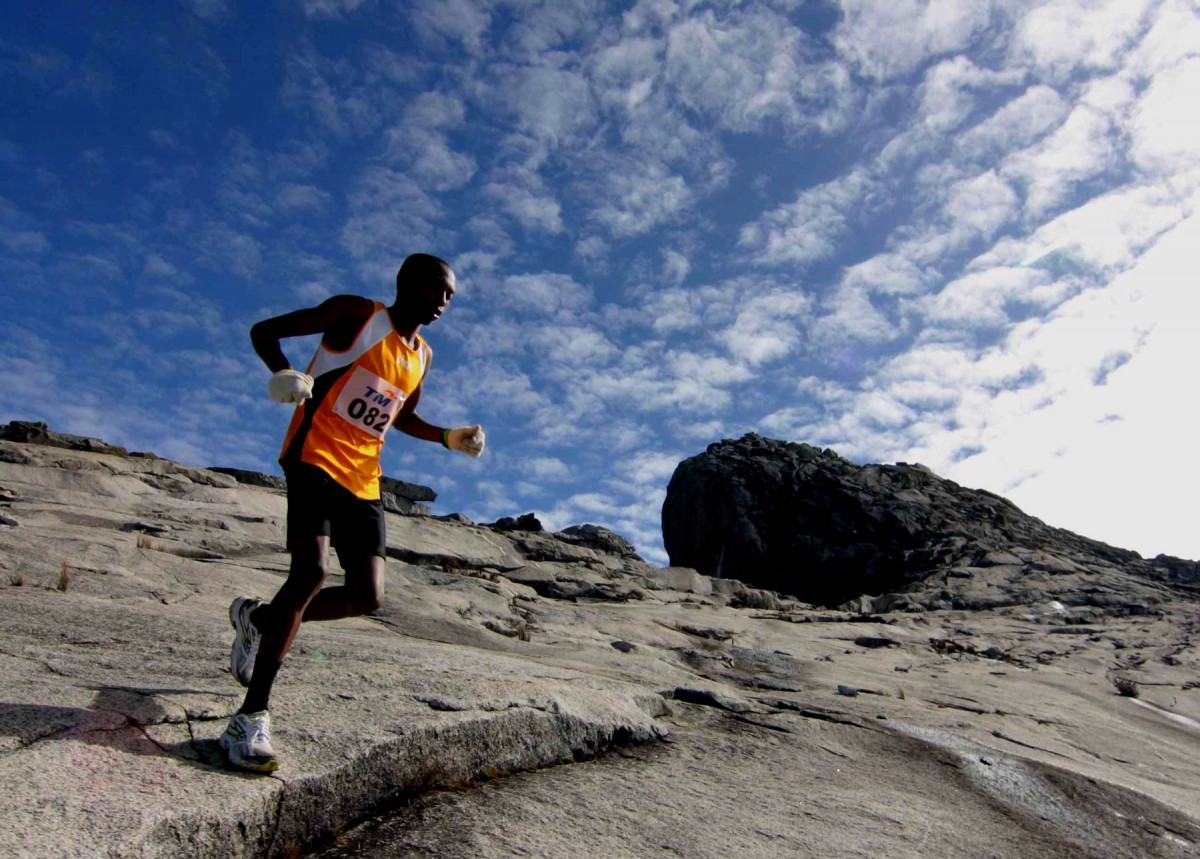
Image credit: Amazing Borneo Tours
The Mount Kinabalu International Climbathon is free for all hikers to join. This 26km race is a true test of strength and endurance that’ll push even the most experienced of hikers to their limits. If you’re a medically and physically fit hiker looking for a challenge, then this might be for you.
After being on hold since 2017, the climbathon is back this 2024 and 2025 to challenge hikers once more.
5. Kundasang War Memorial
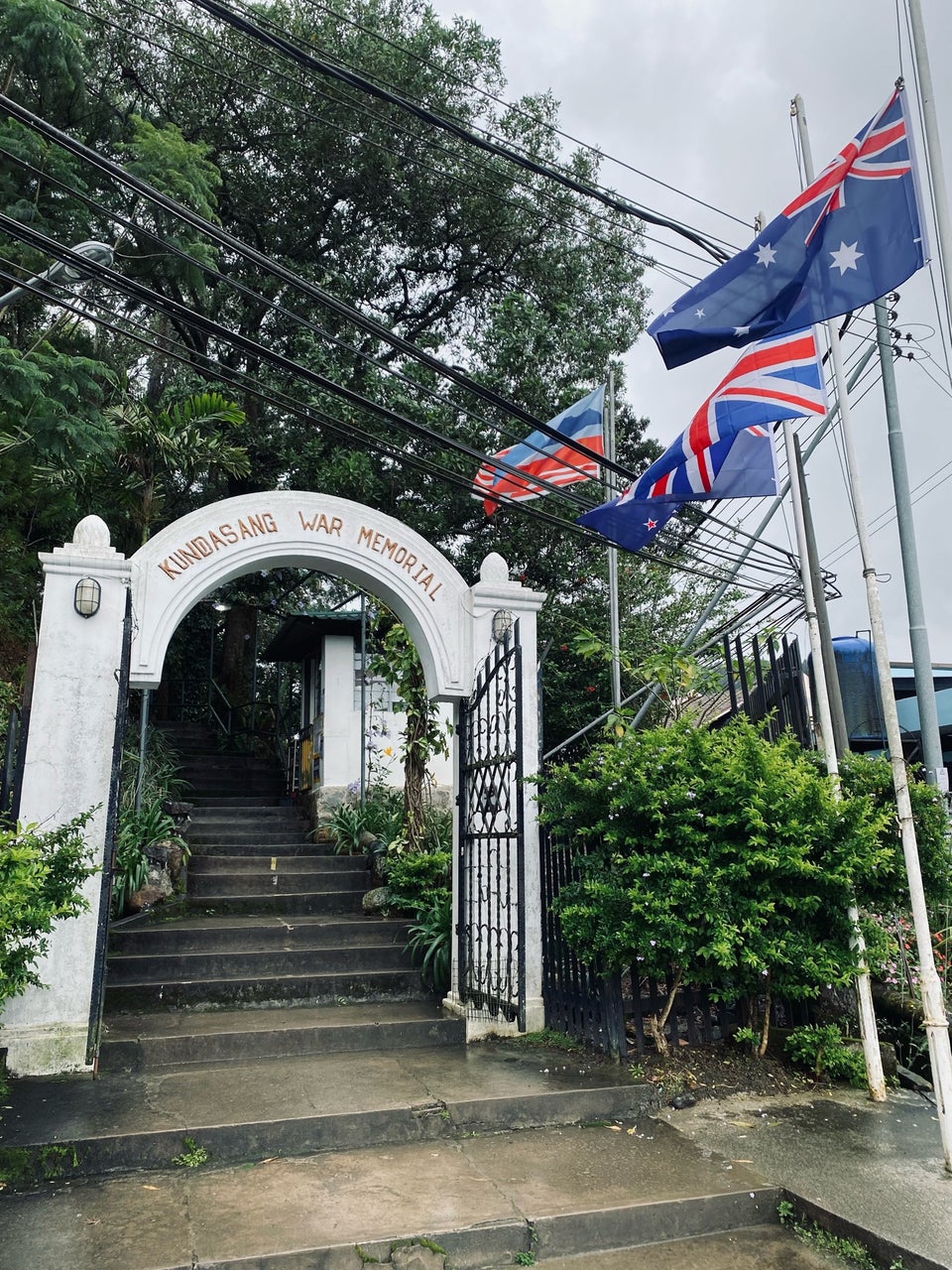
Image credit: ashikinarffn via Foursquare
Established in 1962, the Kundasang War Memorial is one of the first memorials to commemorate Australian and British prisoners of war , who died during the Sandakan death marches in Ranau during World War II. It’s a must-visit for history buffs, who want to learn more about the heroes of war and the history of Kundasang.
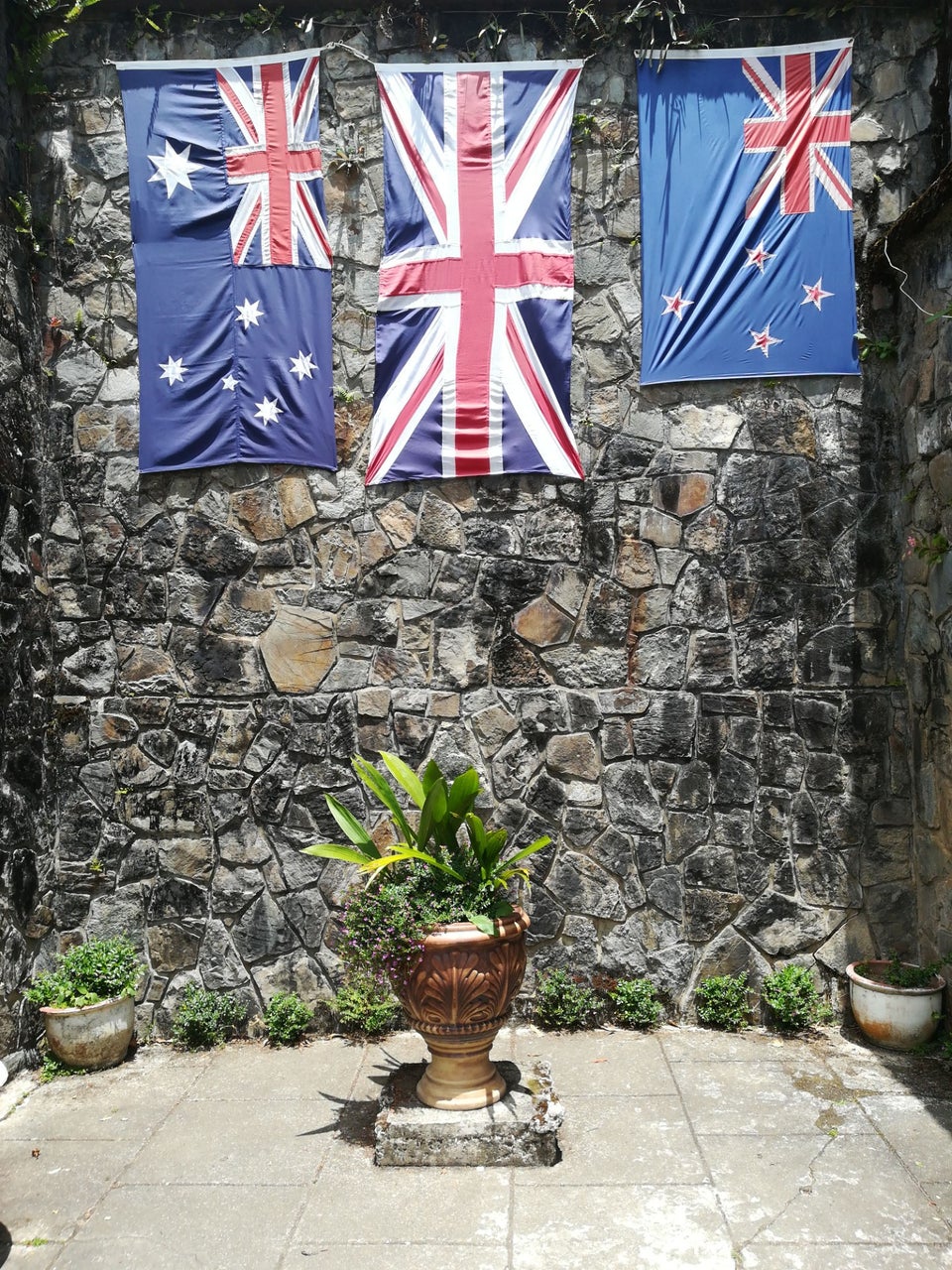
Image credit: SARUMAN via Foursquare
The memorial is divided into four parts: Australian Garden, English Garden, Borneo Garden, and the Contemplation Garden and Pool.
What you need to know before visiting Kinabalu Park in Sabah
When is the best time to visit Kinabalu Park?
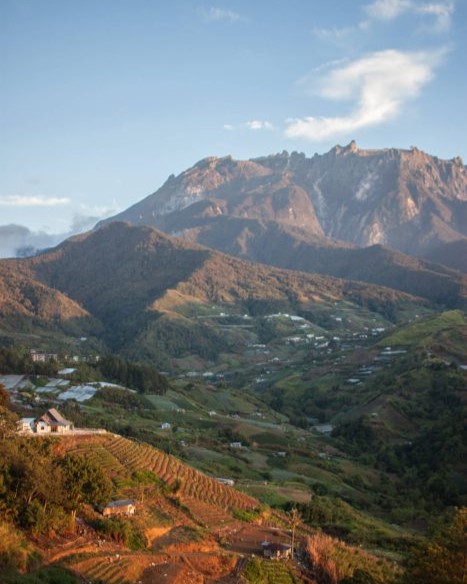
Image adapted from: Time Travel Bee
The best time to visit Kinabalu Park is from March to September. Due to the cooler weather conditions from September to February, the chances of rainfall may hinder your hiking plans and make trail conditions unsafe.
It’s recommended to visit the park during the warm and dry seasons to fully enjoy the activities offered here.
Is camping allowed at Kinabalu Park?
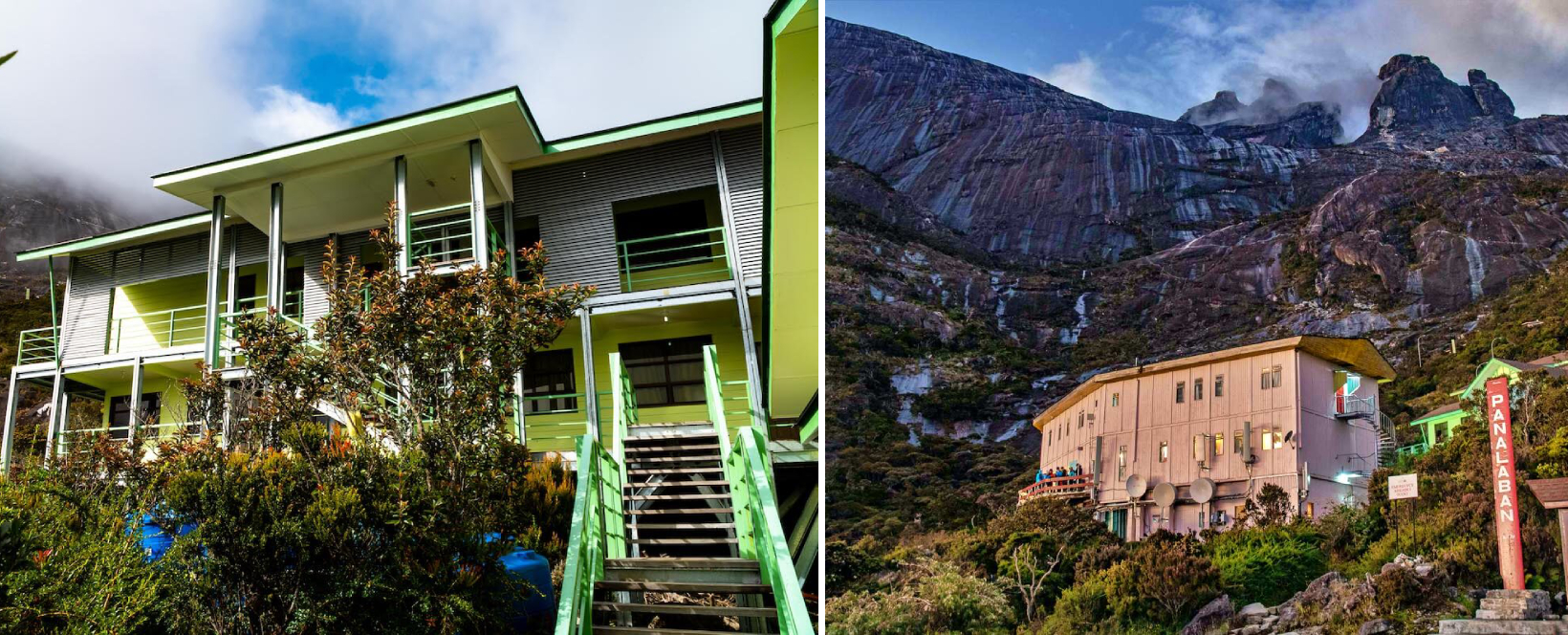
Panalaban Hostel and Laban Rata Resthouse.
Image adapted from: MountKinabalu.com, MountKinabalu.com
Kinabalu Park has a number of stays you can look into, including the Panalaban Hostel and Laban Rata Resthouse. The latter is popular among those taking on the Mount Kinabalu peak, and is reachable after 4-6 hour climb from Kinabalu Park.
Alternatively, you can camp at Poring Hot Spring if you want to sleep under the stars.
Do I need a permit to climb Mount Kinabalu?
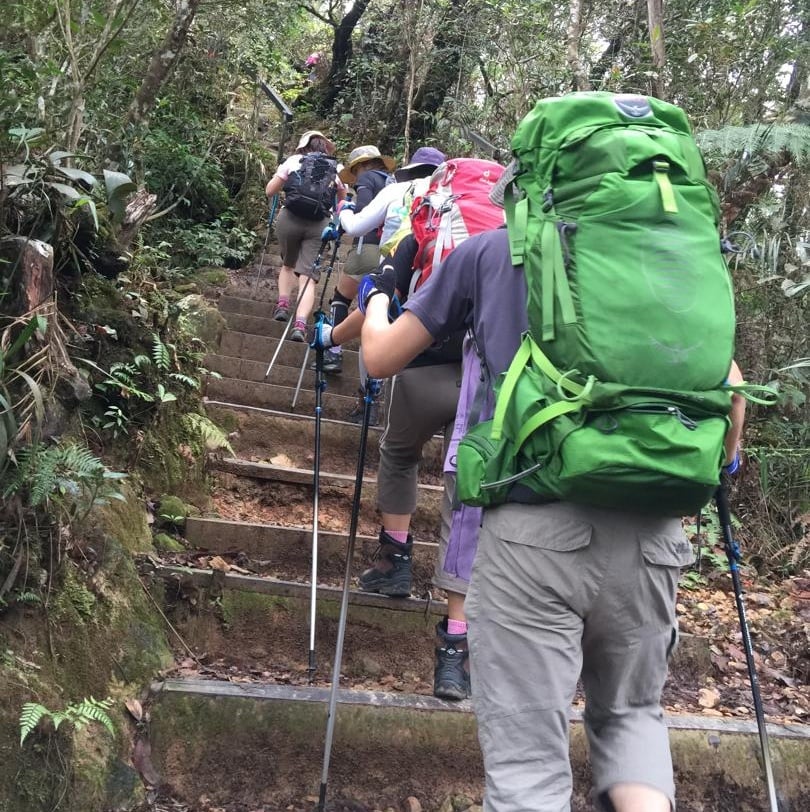
Image credit: South East Asia Backpacker
If you plan to climb Mount Kinabalu, it’s important to note that you must acquire a permit first before doing so. You can either contact a licensed local travel operator such as Amazing Borneo Tours or consider Via Ferrata climbing packages.
Established in 2007, Mount Kinabalu Via Ferrata is a trail fully equipped with iron rungs, footholds, cables, and rails surrounding the north face of the mountain.
Make sure to book your slots at least two to three months prior to the hike as there are a limited number of permits available each day. Also, you must be medically fit and should have trained for a month before hiking the mountain.
Are there accommodations in Kinabalu Park?
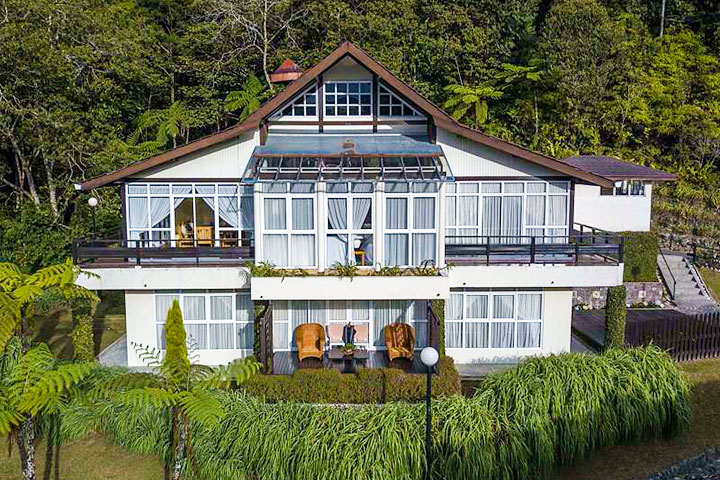
Rajah Lodge within Kinabalu Park.
Image credit: MountKinabalu.com
Just like any upcoming trip, booking accommodations early is crucial for a stress-free experience.
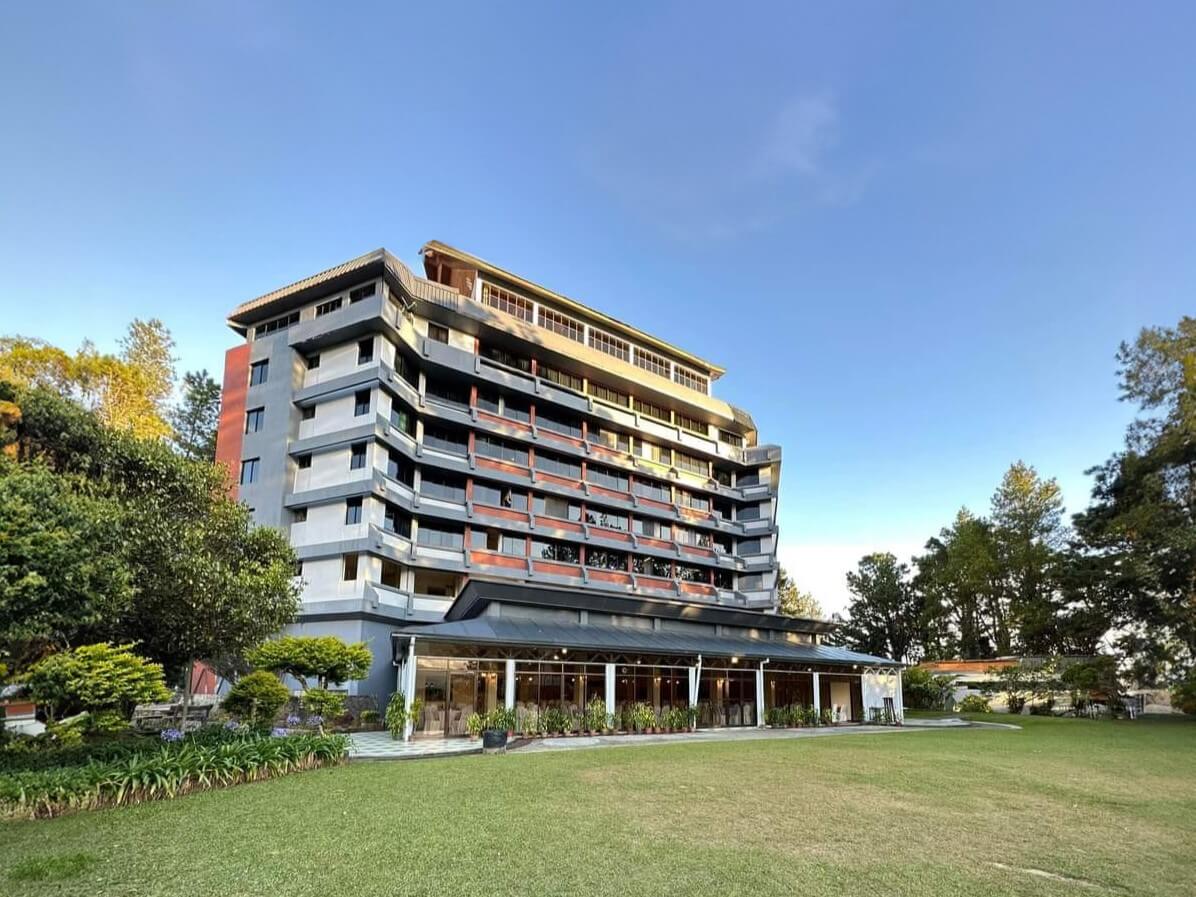
Perkasa Hotel within Kundasang Ranau.
Image credit: MountKinabalu.com
Kinabalu Park and nearby locations such as the Panalaban base camp and Kundasang Ranau offer numerous choices for accommodations, from lodges to hotels.
Getting to Kinabalu Park
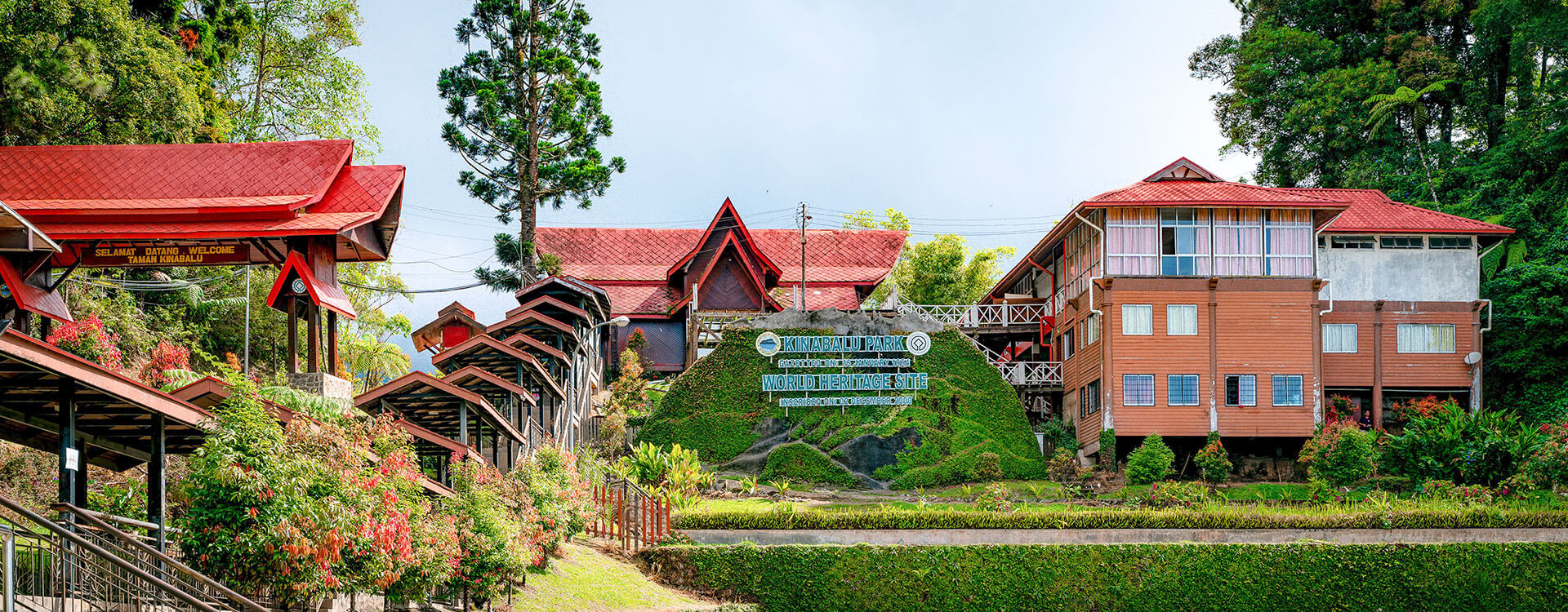
Image credit: MountKinabalu.com
While it’s possible to take public transportation to Kinabalu Park, most guests expressed that this may be hard to come by due to the park’s remote location.
As an alternative, consider booking day-trip and overnight packages that cover transportation to avoid the fuss of multiple booking. These packages usually include visits to Poring Hot Spring, the Canopy Walkway, and Nabalu Market.
If travelling in a group from Kota Kinabalu, you can board a bus (RM30/pax) or a four to six-seater taxi (RM30-RM120/pax). Consider renting a car from a trusty local car service like X and Y. A benefit of this is that you’ll be free to move at your own pace.
If you’re travelling solo, you can ride a minivan or a shared taxi (from RM50/pax) going to Ranau from the airport you arrived at. Simply inform the driver that your destination is Kinabalu Park. You’re also free to utilise ride-hailing apps such as Grab to book a car or taxi to get to the park.
Entrance fees to Kinabalu Park:
- Adults (18 and above): MyKad holders (RM10/pax) | Standard (RM50/pax)
- Children (17 and below): MyKad holders (RM5) | Standard (RM25)
- Free for children below 12, senior citizens & persons with disabilities
Kinabalu Park
Address: Kompleks Asia City, Jalan Asia City, 88000 Kota Kinabalu, Sabah
Opening hours: 8am-5pm, Daily
Contact: 088-448-709 | 010-563-2009 | [email protected] | Mount Kinabalu website | Sabah Parks website
For more things to do in Sabah, check out:
Cover image adapted from: The Backpacking Family, MountKinabalu.com, eBird, Chris L via Tripadvisor
